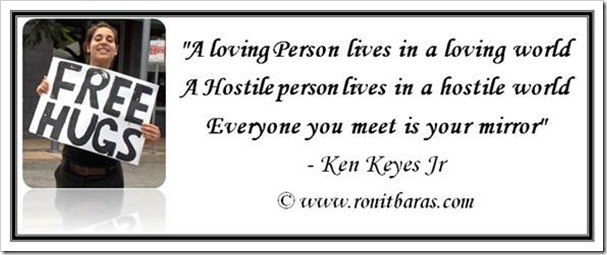 Picture yourself sitting in an old cinema all by yourself, watching a movie. Turn your head towards the back wall and see there a big window. Behind the window, there is a projection machine. In that machine, a long, wide film is running, a film you have created.
Picture yourself sitting in an old cinema all by yourself, watching a movie. Turn your head towards the back wall and see there a big window. Behind the window, there is a projection machine. In that machine, a long, wide film is running, a film you have created.
A strong light travels through the film towards the screen. You can see the beam of light getting wider as it travels through the air, showing flickers of colors and movement inside it. Follow the beam of light with your eyes as it keeps on going and getting wider, until you are facing forward and looking at a huge screen, which practically fills your entire fields of vision.
As you look, you become absorbed in the movie, finding yourself emotionally attached to some of the characters, fearing some of the others, hating a few and getting carried away with the story.
Real life is very much the same. We become absorbed in our own story, which we project onto the world. When we interact with other people, we each look at our own “film” and can get into all kinds of trouble.
What?!
Well, our beliefs are like film. Once we have them, they tend to just stick with us and shed different kinds of light on different parts of our life.
For example, if we have a belief we are not good enough, this will cast a dark shadow on all of our successes. Realistically, we can always find something to improve. Even if we got an A+ on an exam, we can tell ourselves we are not done with school yet. Even if we have great primary-school-aged kids, we can tell ourselves we might have problems when they become teens. This way, we remain not good enough.
 On the other hand, if we have a belief we are friendly and social, this will brighten up every human encounter for us. No matter what someone says, we will quickly find something good about it or use the opportunity to be nice to that person and make the interaction more positive. Either way, we remain friendly and social.
On the other hand, if we have a belief we are friendly and social, this will brighten up every human encounter for us. No matter what someone says, we will quickly find something good about it or use the opportunity to be nice to that person and make the interaction more positive. Either way, we remain friendly and social.
Here is a story to illustrate how this works.
In my circle of family and friends, I am famous for troubleshooting computer problems. I know a fair bit, I like the detective work involved, I have the determination and I like to help and make people happy. So from time to time, I get calls for help with someone’s computer.
Unfortunately, many of them are too far away, which means I cannot see what they are doing and I must rely on them to do as I say and be accurate in their description of what happens at their end.
One day, Ronit’s sister Ora called with a problem. Full of enthusiasm, I started asking her to check different things, until she gave me an answer that did not make any sense to me. I asked her again to do the same thing, but she could not find the buttons and details I was talking about.
After a while, I asked her what she was looking at and realized she had not done exactly as I had said and was looking at a different window than the one in my mind. I backtracked and we kept going from where she was, but inside, I felt she did not trust me enough and was trying her own troubleshooting instead of doing exactly as I said.
At some point, she again told me things that made no sense. I am not very proud of the next bit, but I poured my frustration on her. In the end, we worked out the problem, but both of us were left feeling badly, although I had helped her and her problem had been solved.
To let off my steam, I asked Ronit to walk with me around the block and told her I felt her sister had not trusted me. Ronit, who had witnessed the whole conversation, surprised me by saying, “If you go over what happened again, you’ll see it was you who didn’t trust Ora”.
 I nearly blew up at that, but being the open-minded person that I am (what a great belief to have), we retraced the interaction and I realized I had indeed assumed Ora had misinformed me of things or done the wrong thing, but I had also made mistakes and could have interpreted her actions in other ways, which Ronit was able to do.
I nearly blew up at that, but being the open-minded person that I am (what a great belief to have), we retraced the interaction and I realized I had indeed assumed Ora had misinformed me of things or done the wrong thing, but I had also made mistakes and could have interpreted her actions in other ways, which Ronit was able to do.
Ronit then summarized it for me by saying, “You see yourself in the world around you. You could not trust another person, so all you could see is another person not trusting you and another person who could not be trusted. Had you looked at the same situation without the suspicion, things would have turned out differently”.
This is how projection works. There is a proverb that describes it very nicely, saying, “A camel can only see the other camels’ humps”.
There are many things involved in projecting – communication styles, love languages, beliefs, values and needs – but a critical one (and a hard one to overcome, unfortunately) is interpreting everything from our own point of view at the center of the universe. When we do this, people do things to us, for us and against us, when in fact, they do everything to benefit themselves.
 Here is a quick exercise you can do to notice your projection and possibly overcome some challenges by changing it. I would suggest doing this privately and with your eyes closed in a quiet spot first, when you are nice and relaxed, and trying to do it as things happen later on, after you have had some practice.
Here is a quick exercise you can do to notice your projection and possibly overcome some challenges by changing it. I would suggest doing this privately and with your eyes closed in a quiet spot first, when you are nice and relaxed, and trying to do it as things happen later on, after you have had some practice.
Think back to a heated conversation you have had lately, which has left you confused and irritated. Go over it step by step (to the best of your ability) and do the following:
- Start with a frozen picture of yourself and the other person at the beginning of your argument
- Leave your body and stand outside the discussion space
- “Play” you or the other person saying a sentence or expressing an idea
- Freeze the picture
- Examine the your body language and facial expression
- Examine the other person’s body language and facial expression
- You may already have a glimpse of the difference in each person’s feeling and point of view, but if you do not, float into that person’s body, associate with them fully and see the world through their eyes for a bit until you feel the understanding sinking in
- “Play” the next step
- When you are certain you have gained enough understanding to do things differently next time, float back into yourself, return to here and now, take a deep breath, smile and slowly open your eyes
As a parent, of course, the other person is likely to be your partner, but may very well be one of your kids. When you try to associate with your kids’ feelings, remember that young kids generally feel small and helpless and teenagers generally feel confused, overwhelmed and inadequate. Also, kids do not fully comprehend everything you say.
Another good projection exercise is to ask yourself, “Where have I felt like this before? Do I feel like this often?” If the answer is “Yes”, ask yourself, “When was the very first time I felt like this?”
 Our past experiences, most often from our childhood, play in our minds repeatedly like well-rehearsed stories. They are so familiar to us, they seem to be the only way to behave, but they are not. Obviously, when you feel good with something, the more you do it, the better, but when a familiar scene makes you feel bad, just noticing it may already break its automatic nature and make you aware.
Our past experiences, most often from our childhood, play in our minds repeatedly like well-rehearsed stories. They are so familiar to us, they seem to be the only way to behave, but they are not. Obviously, when you feel good with something, the more you do it, the better, but when a familiar scene makes you feel bad, just noticing it may already break its automatic nature and make you aware.
Again, find a quiet spot and some quiet time, close your eyes and revisit the very first time you experienced the unpleasant chain of events. Analyze it by looking at it from the outside and from each participant’s point of view, noting how different things were from here and now. When you are certain you have learned enough to break the repetitive story, come back to the room, breathe deeply, smile and slowly open your eyes.
I would love to read your experiences with these little imaginary adventures. Please come back and share when you have done one or two.

Live in a loving world,
Gal











